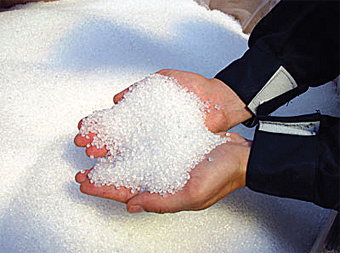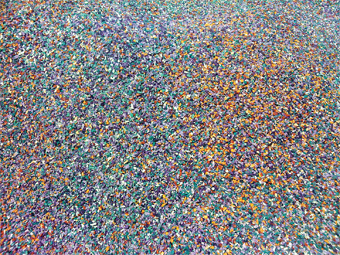
Plastic materials today come in various strength, durability and flexibility that recycling and reusing them would require specific processes. Even with the complexities involved in recycling plastics, the fact remains that the use of recycled materials has resulted in considerable savings in costs and energy consumption, while lowering carbon footprint. The popularity of reclaimed plastics has grown in the past that such material is now used to manufacture packaging products, wood-plastic composite, furniture and a host of other end-products. Prior to recycling, the waste products are crushed into bales and sold to a recycling or waste management company. Sorting is the first step followed by granulating. The size of the resin granules depends upon the processing method that will be used on them as the granules serve as the base forming material for new or future products. Cleaning or washing will also have to be performed on the granulated resins prior to the processing. Material separation, drying and filtering are also performed. Growing concerns to protect the environment by minimising the negative impact of waste products are encouraging the formation of strong partnership between government and the private sector. In October 2009, the United Arab Emirates (UAE) launched a programme to ensure that all plastic bags manufacturers comply to ensure that all plastic bags will be biodegradable by 2013. Another undertaking, the Middle East Waste Summit, targets the reduction in non-biodegradable waste by raising public awareness on the need to recycle. New strategies and processes were discussed and put in place to ensure proper sorting and recycling of domestic waste. Tadweer Waste Treatment LLC, a private waste management company, has been in a strategic partnership with Dubai Municipality to receive 4,000 daily tonnes of waste for recycling. The company's plastic granulation project in the Emirate aims to transform used plastics such as PE into pellets to be used as secondary material for making newer plastic products. During the 2009 Middle East Waste Summit, Tadweer's EnviroCare Manager Lina Chaaban said that Dubai alone generates 3.4 million tonnes of waste annually, of which almost 18% are plastic products. Tadweer has been trying to reduce the impact of landfills by promoting sorting and recycling of waste. In the past, Tadweer has been credited for turning out outdoor furniture, garbage boxes and play parks from plastic films, scraps and hard plastics; which are expected to sustain their durability against rotting and splitting, for about 25 years. The company has also placed recycling bins in schools, offices and shopping malls such as Ibn Battuta Mall.

A unique model After embarking on a wide range of researches conducted in over three years, Tadweer has launched a sorting and recycling facility which is considered one of its kind in the world. As the first company in the Middle East to develop waste management solutions, Tadweer's fully automated sorting and granulating unit utilises state-of-the-art equipment with three sorting lines in order to process the 4,000 tonnes of waste materials. The company's granulating line for plastic waste is designed to process the polyethylene bags by sorting, cleaning and pelletising the plastics into raw materials. A waste water unit accompanies the granulating line to recycle the water to be reused again and again within the states of the process. The Eco-Wood Plastic produced from the whole process is used as raw material for outdoor furniture that are waterproof, highly durable, slip resistant, and can withstand rotting and splitting for as long as 25 years. (the end)
Nike Ambassador 11 Plastic materials today come in various strength, durability and flexibility that recycling and reusing them would require specific processes. Even with the complexities involved in recycling plastics, the fact remains that the use of recycled materials has resulted in considerable savings in costs and energy consumption, while lowering carbon footprint. The popularity of reclaimed plastics has grown in the past that such material is now used to manufacture packaging products, wood-plastic composite, furniture and a host of other end-products. Prior to recycling, the waste products are crushed into bales and sold to a recycling or waste management company. Sorting is the first step followed by granulating. The size of the resin granules depends upon the processing method that will be used on them as the granules serve as the base forming material for new or future products. Cleaning or washing will also have to be performed on the granulated resins prior to the processing. Material separation, drying and filtering are also performed. Growing concerns to protect the environment by minimising the negative impact of waste products are encouraging the formation of strong partnership between government and the private sector. In October 2009, the United Arab Emirates (UAE) launched a programme to ensure that all plastic bags manufacturers comply to ensure that all plastic bags will be biodegradable by 2013. Another undertaking, the Middle East Waste Summit, targets the reduction in non-biodegradable waste by raising public awareness on the need to recycle. New strategies and processes were discussed and put in place to ensure proper sorting and recycling of domestic waste. Tadweer Waste Treatment LLC, a private waste management company, has been in a strategic partnership with Dubai Municipality to receive 4,000 daily tonnes of waste for recycling. The company's plastic granulation project in the Emirate aims to transform used plastics such as PE into pellets to be used as secondary material for making newer plastic products. During the 2009 Middle East Waste Summit, Tadweer's EnviroCare Manager Lina Chaaban said that Dubai alone generates 3.4 million tonnes of waste annually, of which almost 18% are plastic products. Tadweer has been trying to reduce the impact of landfills by promoting sorting and recycling of waste. In the past, Tadweer has been credited for turning out outdoor furniture, garbage boxes and play parks from plastic films, scraps and hard plastics; which are expected to sustain their durability against rotting and splitting, for about 25 years. The company has also placed recycling bins in schools, offices and shopping malls such as Ibn Battuta Mall.
Plastic materials today come in various strength, durability and flexibility that recycling and reusing them would require specific processes. Even with the complexities involved in recycling plastics, the fact remains that the use of recycled materials has resulted in considerable savings in costs and energy consumption, while lowering carbon footprint. The popularity of reclaimed plastics has grown in the past that such material is now used to manufacture packaging products, wood-plastic composite, furniture and a host of other end-products. Prior to recycling, the waste products are crushed into bales and sold to a recycling or waste management company. Sorting is the first step followed by granulating. The size of the resin granules depends upon the processing method that will be used on them as the granules serve as the base forming material for new or future products. Cleaning or washing will also have to be performed on the granulated resins prior to the processing. Material separation, drying and filtering are also performed. Growing concerns to protect the environment by minimising the negative impact of waste products are encouraging the formation of strong partnership between government and the private sector. In October 2009, the United Arab Emirates (UAE) launched a programme to ensure that all plastic bags manufacturers comply to ensure that all plastic bags will be biodegradable by 2013. Another undertaking, the Middle East Waste Summit, targets the reduction in non-biodegradable waste by raising public awareness on the need to recycle. New strategies and processes were discussed and put in place to ensure proper sorting and recycling of domestic waste. Tadweer Waste Treatment LLC, a private waste management company, has been in a strategic partnership with Dubai Municipality to receive 4,000 daily tonnes of waste for recycling. The company's plastic granulation project in the Emirate aims to transform used plastics such as PE into pellets to be used as secondary material for making newer plastic products. During the 2009 Middle East Waste Summit, Tadweer's EnviroCare Manager Lina Chaaban said that Dubai alone generates 3.4 million tonnes of waste annually, of which almost 18% are plastic products. Tadweer has been trying to reduce the impact of landfills by promoting sorting and recycling of waste. In the past, Tadweer has been credited for turning out outdoor furniture, garbage boxes and play parks from plastic films, scraps and hard plastics; which are expected to sustain their durability against rotting and splitting, for about 25 years. The company has also placed recycling bins in schools, offices and shopping malls such as Ibn Battuta Mall.  A unique model After embarking on a wide range of researches conducted in over three years, Tadweer has launched a sorting and recycling facility which is considered one of its kind in the world. As the first company in the Middle East to develop waste management solutions, Tadweer's fully automated sorting and granulating unit utilises state-of-the-art equipment with three sorting lines in order to process the 4,000 tonnes of waste materials. The company's granulating line for plastic waste is designed to process the polyethylene bags by sorting, cleaning and pelletising the plastics into raw materials. A waste water unit accompanies the granulating line to recycle the water to be reused again and again within the states of the process. The Eco-Wood Plastic produced from the whole process is used as raw material for outdoor furniture that are waterproof, highly durable, slip resistant, and can withstand rotting and splitting for as long as 25 years. (the end)Nike Ambassador 11
A unique model After embarking on a wide range of researches conducted in over three years, Tadweer has launched a sorting and recycling facility which is considered one of its kind in the world. As the first company in the Middle East to develop waste management solutions, Tadweer's fully automated sorting and granulating unit utilises state-of-the-art equipment with three sorting lines in order to process the 4,000 tonnes of waste materials. The company's granulating line for plastic waste is designed to process the polyethylene bags by sorting, cleaning and pelletising the plastics into raw materials. A waste water unit accompanies the granulating line to recycle the water to be reused again and again within the states of the process. The Eco-Wood Plastic produced from the whole process is used as raw material for outdoor furniture that are waterproof, highly durable, slip resistant, and can withstand rotting and splitting for as long as 25 years. (the end)Nike Ambassador 11
 iConnectHub
iConnectHub
 Login/Register
Login/Register Supplier Login
Supplier Login


























